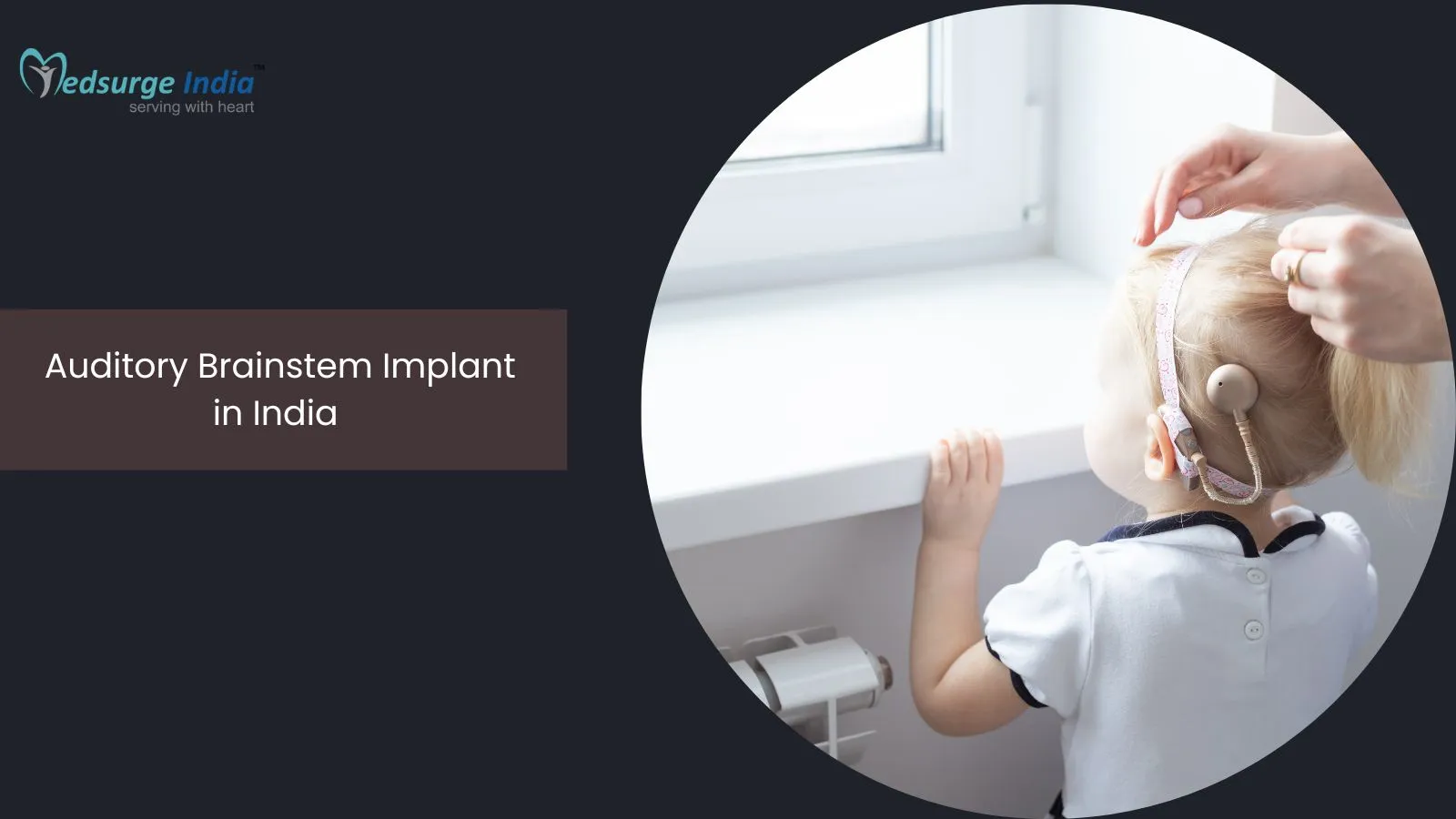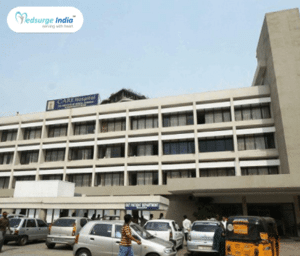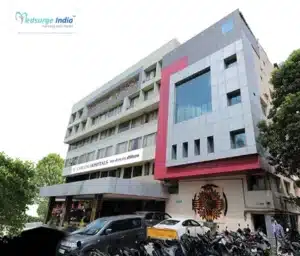Auditory Brainstem Implant Cost in India
Unlock Exclusive Discount : Your Gateway to Premium Healthcare with Medsurge India Health Value Card.

Unlock Exclusive Discount : Your Gateway to Premium Healthcare with Medsurge India Health Value Card.


In people without a working auditory nerve, an Auditory Brainstem Implant (or ABI) restores some hearing. Usually, this type of hearing loss occurs in infants with inner ear abnormalities or an inherited condition known as Neurofibromatosis Type 2 (or Nf2 for short).
People with neurofibromatosis type 2 (NF2) who have non-cancerous tumors on their auditory nerve are the most likely candidates for the Auditory Brainstem Implant in India. People with structural variations in the inner ear may potentially benefit from the ABI.
The total cost of Auditory Brainstem Implant in India is quite affordable as compared to other developed countries like the United States and the United Kingdom. However, the exact cost is likely to vary depending on a variety of factors such as the location you live in, consultation fees with your doctor, preoperative testing, and the facility of your choosing.
An Auditory Brainstem Implant in India is a device that delivers a sense of sound to individuals who have substantial hearing loss due to a missing or non-functioning cochlea (inner ear) or hearing nerve. People can achieve more:
Sound recognition is sometimes combined with word and sentence recognition. The auditory brainstem implant stimulates the brainstem’s hearing circuitry directly, bypassing the inner ear and hearing nerve.
The auditory brainstem implant was developed initially for individuals (adults) with neurofibromatosis type 2 – a rare genetic disorder in which tumors grow on nerves. Adults and children with various nerve and inner ear disorders are now being considered for surgery.
The surgery’s objective is to restore hearing in persons who have lost it. People who are unable to receive a cochlear implant may benefit from an Auditory Brainstem Implant in India. A cochlear implant is an electronic device that directly stimulates the hearing (auditory) nerve by bypassing damaged or nonworking components of the inner ear (cochlea). A cochlear implant delivers superior sound quality in general, however it cannot be used in all settings.
If you have profound hearing loss due to a non-functioning or absent cochlea (inner ear) or auditory (hearing) nerve, you may be a Good Candidate for an Auditory Brainstem Implant in India.
ABI was originally developed for persons with neurofibromatosis 2 (NF2), a rare hereditary condition. Acoustic neuromas, which grow along the auditory nerve in NF2, are tumors. Both the tumors and the treatment for them can permanently harm your auditory nerve. People frequently develop deafness in both ears. In certain cases, hearing aids or cochlear implants cannot restore hearing.
People with NF2 were the first to be implanted with an ABI. Since then, these implants have assisted other people who have substantial hearing loss due to non-functioning or missing hearing nerves or inner ears. ABI can help infants, children, and adults, especially individuals who:
The implant is divided into two parts:
Affordable Auditory Brainstem Implant Cost in India starts from 2000 USD to 35,000 USD. The entire treatment cost plan may vary depending on the type of hospital and city picked by the patient. Also, the Cost of an Auditory Brainstem Implant in India can vary depending on a number of criteria, such as:
The implantation surgery requires the joint effort of a highly skilled surgical team. The team usually consists of a(n):
Auditory brainstem implants are composed of three major components:
If you have neurofibromatosis type 2, the surgery is usually done at the same time as tumors on the hearing (auditory) nerves are removed.
You'll most likely be in the hospital for two to four days following surgery. Depending on the exact condition and type of surgery, the hospital stay could be extended. During surgery, the medical team programmes the device, which is activated a few weeks later.
You'll need several sessions with an audiologist after surgery to tweak the sound processor and learn how to use and interpret the signals. This procedure can take several months. You should see an audiologist every two to four months for the first year, and then once a year after that.
Although an ABI cannot restore normal hearing, it can increase sound awareness, identification, and lip-reading skills. The outcomes vary greatly.
When compared to people with NF2 who have had a long time of deafness, children who obtain an ABI at a young age (after a short term of deafness) show better word understanding.
In addition to the time of profound deafness, other factors that can influence results include involvement in hearing rehabilitation after surgery, the size and location of the tumor, and other medical concerns.
Discuss the risks and advantages with your healthcare physician. You can make an informed decision about your health if you work together. Discuss the risks and advantages with your healthcare physician. You can make an informed decision about your health if you work together.
Meningitis, fluid leaks in the brain and spine, facial nerve weakening, pain, and dizziness are all possible risks following auditory brainstem implants. Despite proper device placement, some people do not benefit from hearing aids.
Although, the complication rate for ABI surgery is low, especially if your surgery is performed by a competent team.
Your surgical team will go over any potential issues and how to treat or manage them. Among the complications are:
Contact the doctor who treated you if you experience a fever or pain following ABI surgery. To avoid difficulties, your team will closely follow you after surgery. You'll also need to see an audiologist following the procedure to adjust the device's programming.
People who have hearing loss due to a damaged or non-functioning auditory nerve may benefit from an auditory brainstem implant. It bypasses the inner ear by sending a signal from an outside sound receiver directly to their brainstem. It can help with sound perception. To get the most out of an ABI, it's ideal to follow it up with speech therapy.
Reference Links:
A: The technology is similar to that used in cochlear implants. The electrodes in the cochlear implant, on the other hand, stimulate your auditory nerve. An ABI stimulates your brain stem by bypassing your auditory nerve.
A: The following applications are disadvantages of brainstem audiometry hearing aid selection: In cases of severe hearing impairment, including no or only weak information about loudness perception. There is no control over the compression setting. There is no frequency-specific correction for hearing loss.
A: If your infant fails the hearing screening, make an appointment for additional testing as soon as possible. If your infant has hearing loss, having them evaluated and treated as soon as possible will most likely result in better outcomes for your baby. At their follow-up appointment at CHOP, your infant will be tested for ABR and OAE.
A: An audiologist inserts miniature earphones and soft electrodes (little sensor stickers) near the child's ears and on the forehead. Electrodes evaluate how the hearing nerves and brain respond to clicking sounds and tones transmitted through the earphones.
A: One of the most intriguing discoveries about the ABR was that it could detect vestibular schwannomas. These tumors often grow from the vestibular section of the eighth nerve, but because they commonly induce hearing loss, they are referred to as "acoustic" tumors.








ENT Surgeon
Head of Department - ENT
38+ Years of Experience
MASSH Super Specialty Hospital
View Doctor
ENT Surgeon
Senior Consultant
40+ years of experience
Manipal Hospital, Panaji, North Goa
View Doctor
ENT Surgeon
Senior Consultant
23+ years of experience
KMC Hospital, Hampankatta, Mangaluru
View Doctor









By using our site, you agree to our Terms and Conditions, Privacy Policy and Refund Policy. Medsurge India provides reliable healthcare information and treatment options to support informed decision-making. Our content is designed to support and complement the guidance of your treating doctor, helping you feel informed and confident throughout your healthcare journey. We also Accept International Payments.

Copyright © 2025 NSM ONLINE SOLUTIONS PRIVATE LIMITED. All rights reserved.